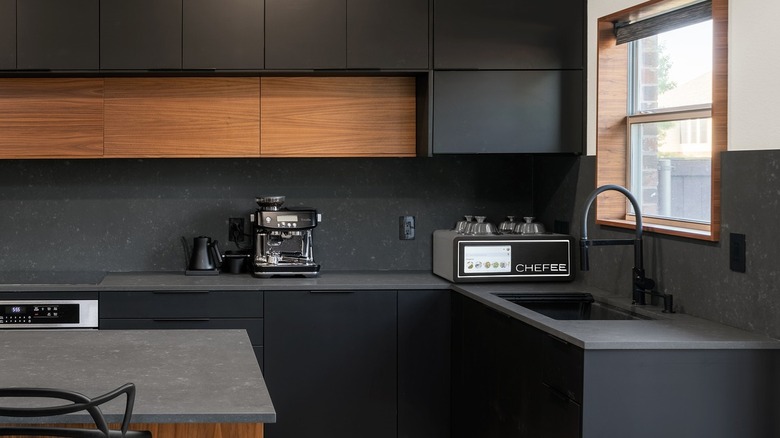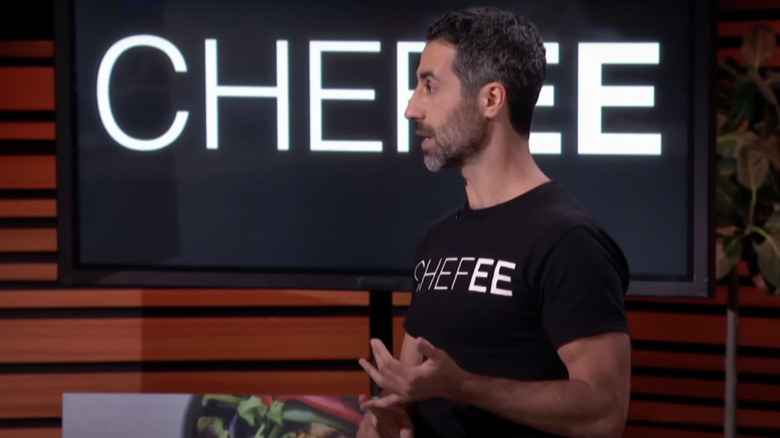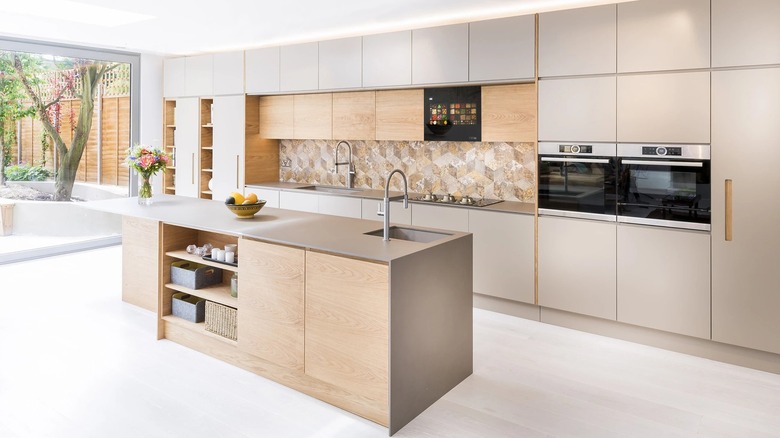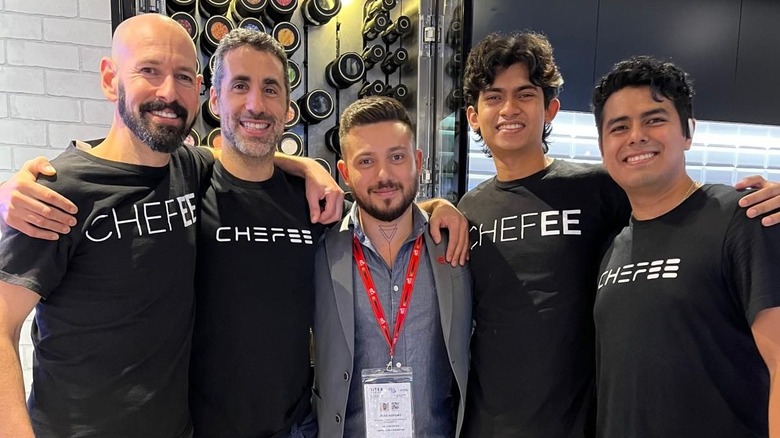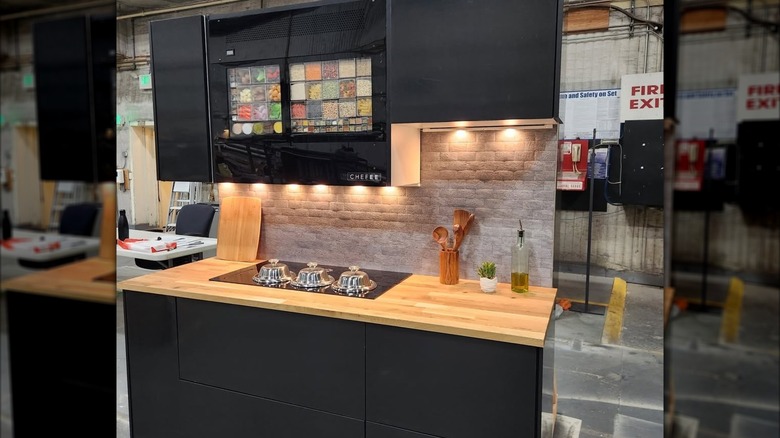Chefee Robotics: Here's What Happened After Shark Tank
In our ever-evolving, fast-paced world, it's no secret that Americans love convenience. In fact, food delivery apps thrive in the U.S., with companies like DoorDash and Uber Eats dominating. And while we love a meal delivered to our door, some people are interested in knowing exactly what ingredients are going into their meals. Enter: Chefee Robotics. A literal robot, Chefee is an automated chef that integrates with your kitchen to prep, cook, and serve meals — all from the tap of your smartphone. You can even order ingredients from your phone to have them delivered each week, and let Chefee do the rest of the work by scheduling meals, including the number of servings you'll need and any dietary restrictions it should keep in mind.
Chefee was founded by former restaurant owner Assaf Pashut in Austin, Texas. Pashut's dream was to automate more tasks in the restaurant so the staff could focus more on customers. He began forming a small team to help bring his vision to life, and over the years, they evolved his passion project into a high-tech, automated kitchen system. Fast-forward to March 2024, and Pashut went on Season 15, Episode 17 of "Shark Tank" looking for a partner to help bring his invention into the homes of hungry customers.
What happened to Chefee Robotics on Shark Tank?
Assaf Pashut stepped into the "Shark Tank" seeking $500,000 in exchange for 4% of the company. Seems straightforward enough, right? At first, all of the Sharks were mesmerized by the idea of a robot making dinner. Pashut gave them a taste of a couple of Chefee's menu items and let them watch in awe as the robot seamlessly prepared a meal. While intriguing, the Sharks began asking questions, wanting to know more about the overall business model and how the company would eventually make money. At the time, the company was pre-revenue, meaning it hadn't made any money yet (or sold any models). Regardless, Pashut told the Sharks he had received a Letter of Intent from a Palm Springs kitchen remodeling company as well as interest from Sub-Zero and Wolf, a luxury appliance brand.
Pashut explained that he was planning to launch with a base kitchen priced around $9,500 and a premium version costing between $40,000 and $50,000 (with the premium version offering more ingredient storage and a refrigeration system). For most of the Sharks, concerns about maintenance and upkeep were dealbreakers, and all but Kevin O'Leary backed out. In the end, O'Leary offered Pashut the $500,000 in exchange for 15% of the company — an 11% increase over what Pashut originally proposed. Pashut countered, asking O'Leary to lower his stake to 8%, but ultimately accepted O'Leary's original offer.
Chefee Robotics after Shark Tank
Chefee's episode aired on March 4, 2024. Just a couple of weeks later, Assaf Pashut gave an interview to The Spoon, where he discussed the company's plans now that Kevin O'Leary was involved. According to Pashut, Chefee Robotics was pivoting slightly to target luxury customers, aiming to secure high-end deals with an exclusive product rather than trying to appeal to the average consumer. With O'Leary's guidance, Chefee would be placed in elite homes, allowing the company to work through potential issues — like recalls or maintenance concerns — with a smaller customer base, instead of mass-distributing and being unable to keep up.
While all of this was happening behind the scenes, Chefee was also working diligently to secure a hefty round of funding. By October 2024 — just seven months after the episode aired — Chefee announced that it had raised $16 million in seed funding. "With these additional resources, we plan to invest in research and development, expand our engineering team, and enhance our marketing efforts to raise public awareness about the transformative possibilities of smart kitchen technology," the company stated. It also noted that the funding would be used to accelerate product development and refine the technology behind it.
Is Chefee Robotics still in business?
Chefee appears to still be in business, as its website is up and running, but it remains unclear whether any models have actually been sold. As of this writing, the site includes an option to request a quote based on individual needs. Customers can choose between stand-alone models and built-in kitchens, though actual pricing is not listed. The company also seems to have shifted its focus further, using language that encourages potential buyers to "boost tenant retention & attract premium tenants" (per Cheffee). It seems Chefee is now marketing to builders and landlords, aiming to integrate the product into luxury apartment complexes, Airbnbs, assisted living facilities, or premium hotels.
Additionally, the website features a section where potential investors can submit offers, whether they are angel investors, venture capitalists, early-stage backers, lead investors, or strategic partners. As for whether Kevin O'Leary is still involved, that remains unclear — he is not mentioned anywhere on Chefee's current website.
What's next for Chefee Robotics?
While we don't yet know exactly what's next for Chefee, Assaf Pashut made a LinkedIn post at the start of 2025 stating that he would be speaking at CES Las Vegas, an annual tech industry trade show. He also shared that the company had secured additional sales and showroom experiences in New York City, San Diego, and Miami.
Though the future of Chefee is somewhat murky — there's still no evidence of one in a private home — the future of robotics in the kitchen is anything but. While vintage kitchen appliances have been making a comeback, artificial intelligence (AI) has also been gaining ground in many industries, including automotive and electronics. According to reports, AI is expected to dominate kitchens throughout 2025 and beyond, with industry powerhouses like Samsung, Sony, and LG investing heavily in smart appliances such as AI ovens. These brands are working to create high-tech kitchen experiences that are more streamlined, personalized, and efficient. There are even smart kitchen appliances and gadgets now, like touch-screen espresso machines and intelligent mugs, designed to make daily life easier.

